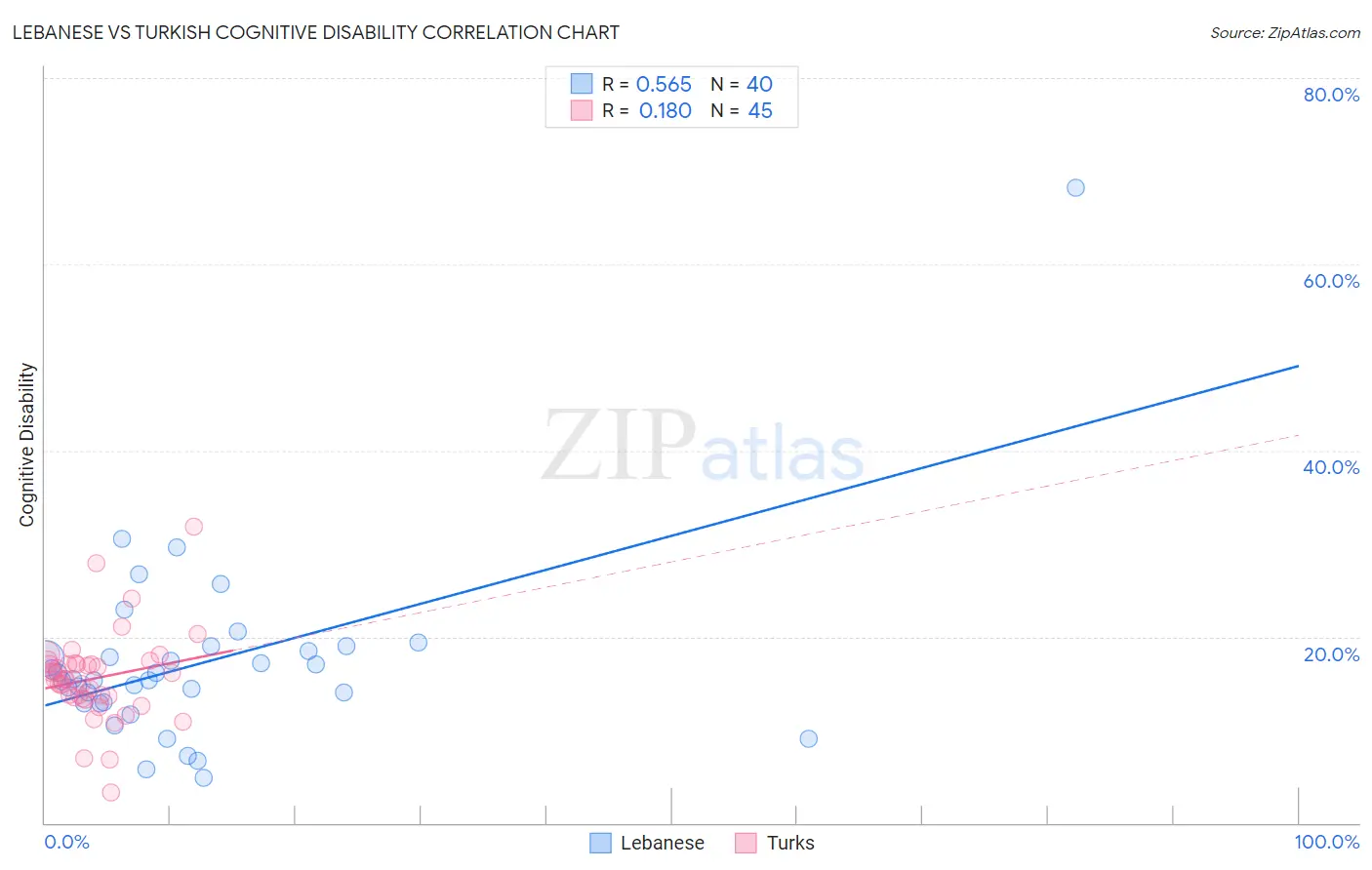Lebanese vs Turkish Cognitive Disability
COMPARE
Lebanese
Turkish
Cognitive Disability
Cognitive Disability Comparison
Lebanese
Turks
17.0%
COGNITIVE DISABILITY
91.3/ 100
METRIC RATING
135th/ 347
METRIC RANK
16.9%
COGNITIVE DISABILITY
94.5/ 100
METRIC RATING
124th/ 347
METRIC RANK
Lebanese vs Turkish Cognitive Disability Correlation Chart
The statistical analysis conducted on geographies consisting of 401,594,018 people shows a substantial positive correlation between the proportion of Lebanese and percentage of population with cognitive disability in the United States with a correlation coefficient (R) of 0.565 and weighted average of 17.0%. Similarly, the statistical analysis conducted on geographies consisting of 271,856,342 people shows a poor positive correlation between the proportion of Turks and percentage of population with cognitive disability in the United States with a correlation coefficient (R) of 0.180 and weighted average of 16.9%, a difference of 0.37%.

Cognitive Disability Correlation Summary
| Measurement | Lebanese | Turkish |
| Minimum | 4.9% | 3.2% |
| Maximum | 68.2% | 31.8% |
| Range | 63.4% | 28.5% |
| Mean | 17.2% | 15.5% |
| Median | 15.4% | 15.5% |
| Interquartile 25% (IQ1) | 12.9% | 13.4% |
| Interquartile 75% (IQ3) | 18.7% | 17.1% |
| Interquartile Range (IQR) | 5.9% | 3.8% |
| Standard Deviation (Sample) | 10.1% | 4.8% |
| Standard Deviation (Population) | 10.0% | 4.8% |
Demographics Similar to Lebanese and Turks by Cognitive Disability
In terms of cognitive disability, the demographic groups most similar to Lebanese are Israeli (17.0%, a difference of 0.030%), Immigrants from Norway (17.0%, a difference of 0.030%), Immigrants from Chile (17.0%, a difference of 0.040%), Welsh (17.0%, a difference of 0.050%), and Immigrants from Jordan (17.0%, a difference of 0.060%). Similarly, the demographic groups most similar to Turks are Portuguese (16.9%, a difference of 0.020%), Immigrants from Western Europe (16.9%, a difference of 0.030%), Immigrants from China (16.9%, a difference of 0.050%), Scandinavian (16.9%, a difference of 0.050%), and Scottish (16.9%, a difference of 0.070%).
| Demographics | Rating | Rank | Cognitive Disability |
| South Africans | 95.5 /100 | #119 | Exceptional 16.9% |
| Scottish | 95.0 /100 | #120 | Exceptional 16.9% |
| Immigrants | China | 94.9 /100 | #121 | Exceptional 16.9% |
| Immigrants | Western Europe | 94.8 /100 | #122 | Exceptional 16.9% |
| Portuguese | 94.7 /100 | #123 | Exceptional 16.9% |
| Turks | 94.5 /100 | #124 | Exceptional 16.9% |
| Scandinavians | 94.1 /100 | #125 | Exceptional 16.9% |
| Europeans | 93.4 /100 | #126 | Exceptional 17.0% |
| Immigrants | Costa Rica | 93.1 /100 | #127 | Exceptional 17.0% |
| Nicaraguans | 93.0 /100 | #128 | Exceptional 17.0% |
| Immigrants | Uruguay | 92.9 /100 | #129 | Exceptional 17.0% |
| Immigrants | Vietnam | 92.4 /100 | #130 | Exceptional 17.0% |
| Immigrants | Germany | 92.1 /100 | #131 | Exceptional 17.0% |
| Whites/Caucasians | 92.1 /100 | #132 | Exceptional 17.0% |
| Immigrants | Jordan | 91.9 /100 | #133 | Exceptional 17.0% |
| Immigrants | Chile | 91.7 /100 | #134 | Exceptional 17.0% |
| Lebanese | 91.3 /100 | #135 | Exceptional 17.0% |
| Israelis | 91.0 /100 | #136 | Exceptional 17.0% |
| Immigrants | Norway | 90.9 /100 | #137 | Exceptional 17.0% |
| Welsh | 90.8 /100 | #138 | Exceptional 17.0% |
| French | 90.0 /100 | #139 | Excellent 17.0% |